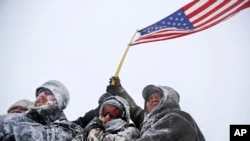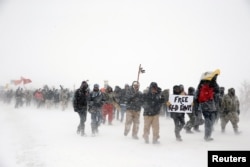The federal government won't send 100 federal officers to help police protests against the Dakota Access oil pipeline in North Dakota as requested, drawing a sharp rebuke Wednesday by the county sheriff who wanted the help, as well as the head of the National Sheriffs' Association.
Sending border patrol and members of the U.S. Marshals Service Special Operations Group might escalate, not ease, tensions between law enforcement and protesters who've camped on federal land for months, Justice Department spokesman Wyn Hornbuckle told The Associated Press.
A dozen North Dakota law enforcement officials implored President Barack Obama in a letter released Monday to send in-person help plus financial assistance, citing costs, fatigue and a growing fear of vigilante justice. The officers, led by Morton County Sheriff Kyle Kirchmeier, said they fear for the safety of themselves, area residents and protesters.
In explaining that DOJ won't fill the request, the agency noted it offered training and technical assistance to local law officers and has worked to facilitate dialogue among law enforcement and opponents of the four-state, $3.8 billion pipeline.
‘Supporting local law enforcement’
“As Attorney General Lynch has said, the department is committed to supporting local law enforcement, defending protesters' constitutional right to free speech and fostering thoughtful dialogue on the matter,” Horbuckle said. “The safety of everyone in the area — law enforcement officers, residents and protesters alike — continues to be our foremost concern.”
But Kirchmeier, who has long been critical of what he perceives to be a lack of federal aid, told the AP that the Justice Department's efforts have not defused tensions and that local officers who have policed the protests for 127 days and made 571 arrests are stretched beyond capacity.
“Only in Washington, D.C., would facilitating meetings be considered ‘action’ in response to the kind of aggression our law enforcement officers and North Dakota citizens have had to face over these past months,” Kirchmeier said in a statement.
The federal government has not been inactive: U.S. Customs and Border Protection at one point last month provided 11 Border Patrol agents to help with policing.
The Standing Rock Sioux tribe and other opponents of the pipeline, which will carry North Dakota oil to a shipping point in Illinois, say the project threatens cultural sites and the tribe's drinking water, which is drawn from the Missouri River. Pipeline work is stalled while Texas-based developer Energy Transfer Partners and the Army battle in court over permission for the pipeline to cross under the river — the last big chunk of construction.
The protest encampment has thinned out in recent days from several thousand people to a few hundred due to the work stoppage and harsh winter weather, but there have been a handful of arrests over the past week.
Push for more help
National Sheriffs’ Association Executive Director Jonathan F. Thompson said the group is grateful for the efforts of the DOJ's Community Oriented Policing Services, which sent teams to Bismarck in September and October for training and technical assistance. However, Thompson said it's not enough.
“The critical value sheriffs need, and have asked [for] dozens of times, is for federal law enforcement officers to be on the ground,” he said, adding that “we have asked, pleaded and nearly begged.”
The DOJ also has told North Dakota officials that it will consider allowing the state to repurpose more than $1 million in Justice Assistance Grant money, which is for efforts to prevent and control crime and improve the criminal justice system.
Considering the state has dedicated up to $17 million in emergency spending for protest-related costs, Thompson said the monetary offer is “a Band-Aid on a hemorrhage.”














